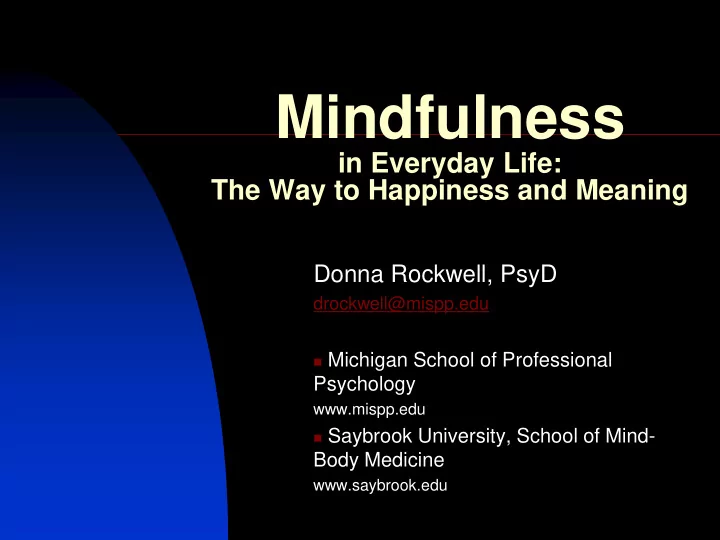

Mindfulness in Everyday Life: The Way to Happiness and Meaning Donna Rockwell, PsyD drockwell@mispp.edu Michigan School of Professional Psychology www.mispp.edu Saybrook University, School of Mind- Body Medicine www.saybrook.edu
Welcome to the Webinar, Mindfulness in Everyday Life Donna Rockwell, Psy.D. and Lisa Firestone, Ph.D. Donna Rockwell, Psy.D. Lisa Firestone, Ph.D. is a licensed clinical psychologist, is the Director of Research and adjunct faculty member, community Education The Glendon outreach worker, columnist, and Association and a Senior Editor at mindfulness meditation teacher. PsychAlive.org. http://www.donnarockwell.com http://www.psychalive.org/ Follow us on Twitter http://twitter.com/@psychalive Tweet about this webinar:#psychalivewebinar Like us on Facebook http://www.facebook.com/PsychAlive
Poll #1 Do you have any knowledge of Buddhism? None A little Quite a bit I am a practicing Buddhist
Human Suffering Anxiety Depression Major Life Changes Existential Angst THE FOUR NOBLE TRUTHS…
First Noble Truth Suffering/Stress is inherent in life This truth is inescapable because the cycle of life for everyone is: Birth Old Age Sickness Death
Second Noble Truth Suffering/Stress has a cause: Resisting the law of impermanence through attachment Desire 1. Grasping 2. Clinging 3.
Third Noble Truth There is a WAY OUT of the Suffering/Stress
Fourth Noble Truth Reduce suffering/stress by learning to live in the here-and-now of the present moment Avoiding obsessing over the PAST (ruminative thinking) Avoid projecting fear into the FUTURE (ruminative thinking)
Lived Experience Phenomena and reception + response = lived experience (Wallis, Winter 2008, p. 79)
Poll #2 What is your experience with mindfulness meditation? No exposure I’ve heard of it but don’t know much about it I meditate once in a while I meditate most days I’ve had a practice for years
What is Mindfulness? Paying attention in a particular way: on purpose, in the present moment, and non-judgmentally. Kabat-Zinn, 1994 (1) Awareness, (2) of present experience, (3) with acceptance. Germer et al., 2005
Mindfulness Meditation Practice Mindfulness Meditation: is a technique or intervention that helps alleviate stress is a way to change our conditioned response patterns provides the opportunity to see clearly how the mind actually works (desire, grasping, clinging; dwelling in past and future) trains the mind to observe phenomena without being swept away by thought or emotion affects our lived experience by heightening mental control and emotional regulation leads to greater happiness
“ Monkey Mind ” RELATIONSHIP TO THOUGHTS THOUGHT ATTRACTION NEUTRAL AVERSION (Passion ) (Ignorance) (Agression) Snake Pig Rooster "I want more." "Whatever!" "I want less."
Mind/Body Implications of Mindfulness Meditation DECREASE in: Cortisol (stress hormone) Fight or flight response Anxiety, Depression, Chronic Pain, Mood Imbalance, PTSD, Attention Problems, Substance Abuse Heart disease, hypertension, cardiovascular disease, high blood pressure, chronic pain, and some cancers Research and clinical studies show that a regular mindfulness meditation practice can decrease such health concerns National Institutes of Health, Office of Alternative Medicine, 1994 Omnibus 25-Year Report on Meditation
Mind/Body Implications of Mindfulness Meditation INCREASE in: immune response the body ’ s ability to produce hormones like endorphins, melatonin, and DHEA, associated with improved immune response and feelings of pleasure pre-frontal cortex activation (cognitive skills, higher level reasoning and integration, emotional intelligence) here-and-now awareness, appreciation, gratitude, meaning, relationship satisfaction, heightened sensory experience, contentment, happiness, and a greater sense of peace and joy
Approach to Mindfulness Meditation ALAN WATTS (1996): Meditation is…the art of suspending verbal and symbolic thinking for a time, somewhat as a courteous audience will stop talking when a concert is about to begin. Simply sit down close your eyes, and listen to all sounds that may be going on--without trying to name or identify them. Listen as you would listen to music. (p. 92)
Enlightenment OPTIMAL STRESS REDUCTION PRACTICE mindfulness meditation by focusing on the natural flow of the breath, returning awareness from thought back to out-breath, over and over again. This practice quiets the busyness of mind, which contributes to clarity and wisdom MINDFULNESS of the here-and-now, rather than being preoccupied or obsessed by past or future thinking NONJUDMENTAL attention to unfolding moment ACCEPTANCE rather than rejection of present experience GRATITUDE and APPRECIATION lead to greater happiness
“ The mind is man ’ s connection system. ” (E.L. Thorndike in Fitzpatrick, 1953, p. 452)
Meditation Exercise Watch on YouTube: How to Meditate: Dr. Donna Rockwell on Mindfulness Meditation http://www.youtube.com/watch?v=igpaPVWmCXk
Join Lisa and Donna at: Workshop Retreat at Esalen – Big Sur, CA
Upcoming Webinars from PsychAlive.org Apr. 18 FREE Webinar Mindfulness in Everyday Life: The Way to Happiness and Meaning Free Webinar Presenter: Dr. Donna Rockwell 11am – 12pm PST See a Full List of Upcoming Free and CE Webinars with Dr. Lisa Firestone and other Expert Presenters at: Learn more or register at http://www.psychalive.org/2012/01/upcoming-webinars-2/
Donna Rockwell, PsyD http://www.donnarockwell.com drockwell@mispp.edu Watch and read interviews with Donna Rockwell at PsychAlive.org www.psychalive.org/author/dr-donna-rockwell/ Michigan School of Professional Psychology www.mispp.edu Saybrook University, School of Mind-Body Medicine www.saybrook.edu
Contact: Glendon@Glendon.org 800-663-5281 Lisa Firestone, Ph.D. Director of Research and Education The Glendon Association Senior Editor PsychAlive.org THE GLENDON ASSOCIATION (For the Public) (For Professionals) www.psychalive.org www.glendon.org
Recommend
More recommend